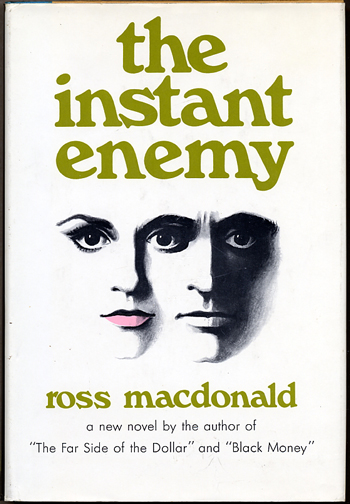Another intricate krimi from this master, Ross Macdonald, he of California sunshine noir.
This is Macdonald’s take on the generation gap of the 1960s. Young Davy and even younger Sandy seem bound for mutually assured self-destruction while taking a few others with them.

Sebastian, Sandy’s father calls in Lew Archer to find them and return Sandy home. While Sebastian offers a good front, it does not take Archer long to realise there is no back to this front. Sebastian failed to make the transition from a promising young businessman to a successful one. Behind the trophy wife, model home, and new car Archer finds a loveless marriage, a silent house, and many unpaid bills, while Sebastian dances attendance on his wealthy boss, Stephen Hackett, in the hope of….something.
Then Hackett is kidnapped at gunpoint by none other than the two teenagers, Davy and Sandy. Unbelievable but true. Why?
It is a tangled skein and by the end I needed a genealogical chart because this one spans three generations. It is a cocktail of Macdonald’s themes, an unloved child, a misused child, illicit drugs, denied kinship, a surly subordinate, a very nice woman who knows too much, a venal older woman with a toy boy husband, and assorted police officers including a bent one.
The body count reaches Midsomer proportions while Archer develops, applies, tests, and rejects alternative hypotheses until at last one fits.
While the principle cast seems to consist of disparate people with nothing in common, in fact, on that family tree, they are entwined by marriage and murder, the latter seeming to be the stronger bond.
In addition to the rebels with a cause in the teenagers, Macdonald also adds some Cain and Abel. And as frequently the case in his novels, there is a black widow who has consumed two husbands.
Against the array of vipers and the lost teenagers, Archer meets some very solid citizens. Alma in the nursing home, a school guidance counsellor who goes beyond the call of duty, a security guard who keeps his word come what may, many others who lend a land, like truck driver who finds Archer on the highway, Al at the sandwich bar, and gas pump jockey with a calliper on his leg, each of whom reminds the reader of all the decent people out there.
The imagery at times transcends the story as when Archer admits to himself that he likes the work, late at night, driving from one place to another like an antigen connecting cells in the great body of Southern California.
Skip to content
